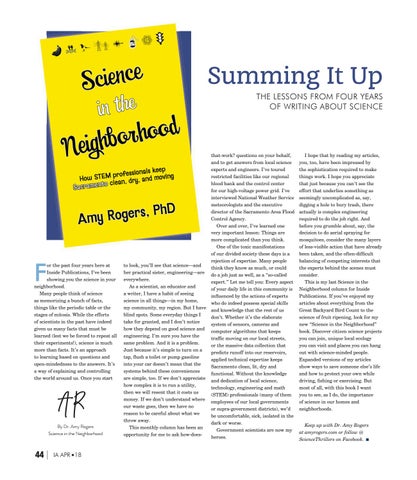Summing It Up THE LESSONS FROM FOUR YEARS OF WRITING ABOUT SCIENCE
F
or the past four years here at Inside Publications, I’ve been showing you the science in your neighborhood. Many people think of science as memorizing a bunch of facts, things like the periodic table or the stages of mitosis. While the efforts of scientists in the past have indeed given us many facts that must be learned (lest we be forced to repeat all their experiments!), science is much more than facts. It’s an approach to learning based on questions and open-mindedness to the answers. It’s a way of explaining and controlling the world around us. Once you start
AR By Dr. Amy Rogers Science in the Neighborhood
44
IA APR n 18
to look, you’ll see that science—and her practical sister, engineering—are everywhere. As a scientist, an educator and a writer, I have a habit of seeing science in all things—in my home, my community, my region. But I have blind spots. Some everyday things I take for granted, and I don’t notice how they depend on good science and engineering. I’m sure you have the same problem. And it is a problem. Just because it’s simple to turn on a tap, flush a toilet or pump gasoline into your car doesn’t mean that the systems behind these conveniences are simple, too. If we don’t appreciate how complex it is to run a utility, then we will resent that it costs us money. If we don’t understand where our waste goes, then we have no reason to be careful about what we throw away. This monthly column has been an opportunity for me to ask how-does-
that-work? questions on your behalf, and to get answers from local science experts and engineers. I’ve toured restricted facilities like our regional blood bank and the control center for our high-voltage power grid. I’ve interviewed National Weather Service meteorologists and the executive director of the Sacramento Area Flood Control Agency. Over and over, I’ve learned one very important lesson: Things are more complicated than you think. One of the toxic manifestations of our divided society these days is a rejection of expertise. Many people think they know as much, or could do a job just as well, as a “so-called expert.” Let me tell you: Every aspect of your daily life in this community is influenced by the actions of experts who do indeed possess special skills and knowledge that the rest of us don’t. Whether it’s the elaborate system of sensors, cameras and computer algorithms that keeps traffic moving on our local streets, or the massive data collection that predicts runoff into our reservoirs, applied technical expertise keeps Sacramento clean, lit, dry and functional. Without the knowledge and dedication of local science, technology, engineering and math (STEM) professionals (many of them employees of our local governments or supra-government districts), we’d be uncomfortable, sick, isolated in the dark or worse. Government scientists are now my heroes.
I hope that by reading my articles, you, too, have been impressed by the sophistication required to make things work. I hope you appreciate that just because you can’t see the effort that underlies something as seemingly uncomplicated as, say, digging a hole to bury trash, there actually is complex engineering required to do the job right. And before you grumble about, say, the decision to do aerial spraying for mosquitoes, consider the many layers of less-visible action that have already been taken, and the often-difficult balancing of competing interests that the experts behind the scenes must consider. This is my last Science in the Neighborhood column for Inside Publications. If you’ve enjoyed my articles about everything from the Great Backyard Bird Count to the science of fruit ripening, look for my new “Science in the Neighborhood” book. Discover citizen science projects you can join, unique local ecology you can visit and places you can hang out with science-minded people. Expanded versions of my articles show ways to save someone else’s life and how to protect your own while driving, fishing or exercising. But most of all, with this book I want you to see, as I do, the importance of science in our homes and neighborhoods. Keep up with Dr. Amy Rogers at amyrogers.com or follow @ ScienceThrillers on Facebook. n
